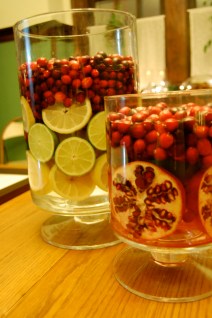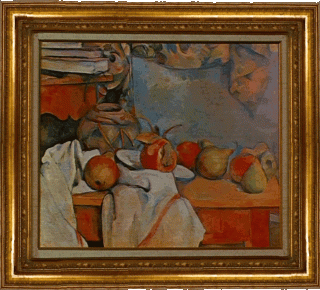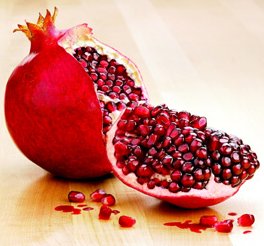On Monday I made these centerpieces using some hurricane jars we received for our wedding:
 |
| Easy, cheap & very pretty. |
As you can see, I used all sorts of fruit. I was only planning on using cranberries, lemons & limes, but when I went to the grocery store, they had pomegranates on sale four for five dollars. They’re pretty fruits cut or uncut, so I thought I’d give it a shot. While cutting the pomegranates for the centerpieces, it dawned on me that a). I’ve never eaten pomegranate b). I had no clue how to eat a pomegranate. So what did I do? What every American does when faced with a problem. I googled it.
It turns out that with pomegranates you eat the seeds, and let me tell you, they are delicious. Now, I have never met a fruit I didn’t like but when I popped a handful of pomegranate seeds into my mouth, I was amazed. They are so good!
Anyway. This got me to thinking. One of my favorite poems of all time is called ” The Pomegranate” by Eavan Boland.
The Pomegranate
The only legend I have ever loved is
the story of a daughter lost in hell.
And found and rescued there.
Love and blackmail are the gist of it.
Ceres and Persephone the names.
And the best thing about the legend is
I can enter it anywhere. And have.
As a child in exile in
a city of fogs and strange consonants,
I read it first and at first I was
an exiled child in the crackling dusk of
the underworld, the stars blighted. Later
I walked out in a summer twilight
searching for my daughter at bed-time.
When she came running I was ready
to make any bargain to keep her.
I carried her back past whitebeams
and wasps and honey-scented buddleias.
But I was Ceres then and I knew
winter was in store for every leaf
on every tree on that road.
Was inescapable for each one we passed.
And for me.
It is winter
and the stars are hidden.
I climb the stairs and stand where I can see
my child asleep beside her teen magazines,
her can of Coke, her plate of uncut fruit.
The pomegranate! How did I forget it?
She could have come home and been safe
and ended the story and all
our heart-broken searching but she reached
out a hand and plucked a pomegranate.
She put out her hand and pulled down
the French sound for apple and
the noise of stone and the proof
that even in the place of death,
at the heart of legend, in the midst
of rocks full of unshed tears
ready to be diamonds by the time
the story was told, a child can be
hungry. I could warn her. There is still a chance.
The rain is cold. The road is flint-coloured.
The suburb has cars and cable television.
The veiled stars are above ground.
It is another world. But what else
can a mother give her daughter but such
beautiful rifts in time?
If I defer the grief I will diminish the gift.
The legend will be hers as well as mine.
She will enter it. As I have.
She will wake up. She will hold
the papery flushed skin in her hand.
And to her lips. I will say nothing.
~Eavan Boland
*A Few Interesting Facts About Pomegranates:
1. The name "pomegranate" derives from mead evil Latin pōmum "apple" and grānātum "seeded."
2. Loaded with vitamins and antioxidants.
3. Pomegranates are native to Iran.
4. The pomegranate has been traced back as far as 3,000 B.C.
5. King Tut was buried with pomegranates in hopes of a second life.
6. Pomegranates are mentioned in Homer's Odyssey, and Juliet tells
Romeo the night is young since it is the nightingale — and not the lark
— that is "singing in yon pomegranate tree."
* I got this info from Pomegranates: Jewels In The Fruit Crown.
 |
| Still Life with Pears and Pomegranates by Paul Cezanne. |

